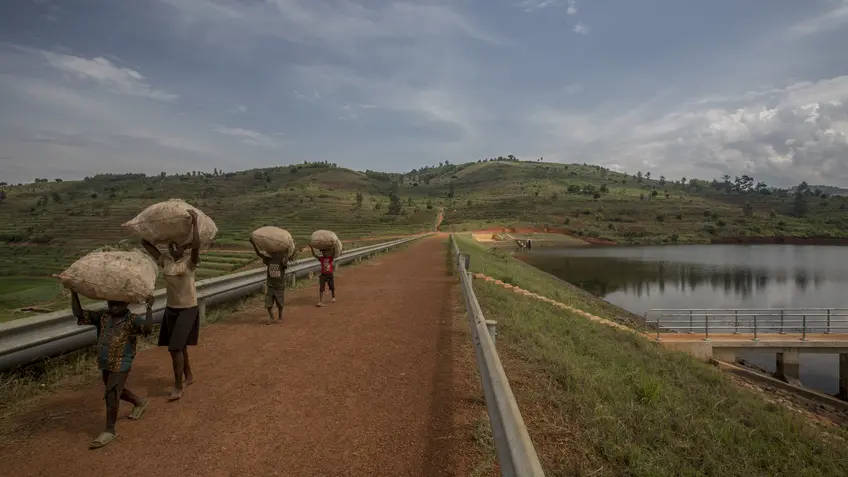Rwanda Raises its Mitigation Ambitions and Builds Readiness for Climate Finance
“Rwanda’s firm commitment to climate action can be seen in this revised NDC, which increases ambition in all components. It is particularly focused on transparency, clarity and the monitoring of the goals we have set for ourselves. As a party to the Paris Agreement, Rwanda is committed to setting ambitious targets needed to enact change.”
- Dr. Jeanne d’Arc Mujawamariya, Minister of Environment, Republic of Rwanda
Rwanda’s ambitious NDC revision is the result of government leadership and broad national engagement. Joining the NDC Partnership in 2018, Rwanda benefited from the consolidated support of various partners to link national climate and development goals. The country is now preparing for the NDC implementation plan with broad stakeholder buy-in.
BROAD NATIONAL ENGAGEMENT IN NDC REVISION
In May 2020, Rwanda was the first African country to submit its NDC revision to the UNFCCC Secretariat. The updated NDC sets out Rwanda’s bold commitment to reduce GHG emissions by 38 percent and includes adaptation measures in priority sectors, including water, agriculture, land, forestry, human settlement, transport, health, and mining.
The revision process involved consultations with government, private sector, and civil society representatives through a range of groups, workshops, and discussions. For example, the Ministry of Environment (MoE) convened different government sectors through existing governance mechanisms, such as Sector Working Groups and Joint Sector Reviews.
At the same time, efforts were made to build NDC revision awareness with the private sector to gain its buy-in and commitment to implementation. This culminated in establishing Private Sector Committees, providing a space for ongoing dialogue and promoting implementation of climate actions by the Rwandan private sector:
- The First committee will be led by the CEO of Rwanda’s Green Fund (FONERWA) and comprised of the DG of Environment and Climate Change at the Ministry of Environment and the Chief Advocacy Officer at the Rwanda Private Sector Federation (PSF). Mrs. Ayaan Z. Adam, Director of the Private Sector Facility at GCF, will contribute to the committee’s activities remotely. This committee’s mandate is coordinating climate action financing in Rwanda’s private sector and ensuring that private sector projects are submitted to GCF and other financing institutions.
- The second committee, comprised of Rwanda Private Sector Federation (PSF) members, will work with the private sector community to compile climate change-related projects and submit them to the first committee for analysis, guidance, and resource mobilization.
Similarly, the MoE hosted engagements with Rwandan civil society, including members of the Association of Professional Environment Practitioners and members of Environment and climate change umbrellas, ensuring their involvement in the revision process and discussing their roles and responsibilities in national efforts towards NDC implementation.
These consultations and engagements allow Rwanda to ensure its revised NDC reflects the needs and ambitions of multiple sectors and key stakeholders.
LINKING CLIMATE AND DEVELOPMENT GOALS
Strategic partners assist Rwanda in raising mitigation ambitions, integrating NDC priorities into national and sub-national plans, and building readiness for climate finance.
By developing quantifiable mitigation and adaptation targets, the World Bank supported Rwanda in increasing NDC ambitions based on a more detailed and robust assessment. The World Bank also conducted a deep dive to pave the way for establishing innovative financing instruments. These include non-grant financial instruments used to accelerate climate change mitigation initiatives (e.g., a Green Guarantee/leasing facility) to scale up climate action in Rwanda. In the framework of enabling effective implementation, the World Bank supports efforts to develop and elaborate the MRV framework for Rwanda’s updated NDC.
UNDP assisted Rwanda through a three-year project to develop a project funding pipeline, building on concept notes developed from within NDC Partnership Plan activities. The same project will provide a deep dive in the agriculture sector and will build government capacity to mainstream gender in NDC implementation.
With technical assistance from the Swedish Environmental Protection Agency, Rwanda will strengthen national capacity for NDC implementation, tracking progress and reporting by upgrading the existing result-based monitoring and evaluation system and training sector experts. Rwanda also cooperates with the German Government (through KfW) to implement adaptation priorities, especially in sectors such as environment, forestry, water, and energy. A study on potential implementation projects is ongoing.
Finally, through the CAEP (see How the Partnership Works section), Rwanda is strengthening its MRV through conducting baseline studies in the agriculture sector. Support, through the CAEP, was also mobilized to the Rwanda Private Sector Federation to develop private sector projects and ideas that will contribute to NDC implementation, with support from the NDC Partnership Support Unit. In the same CAEP context, the World Bank supports integrating NDC priorities in district plans and identifying project ideas in four pilot districts. The pilot districts were selected in collaboration with the Ministry of Local Government and the focal points nominated at each district.
All these initiatives will allow Rwanda to put together good information (project pipeline) from different stakeholders to mobilize resources.
Members supporting Rwanda: Germany (through KfW); UNDP; the Swedish Environmental Protection Agency; and the World Bank.
This is a PiA 2020 story: Browse the multimedia version or PDF version.
